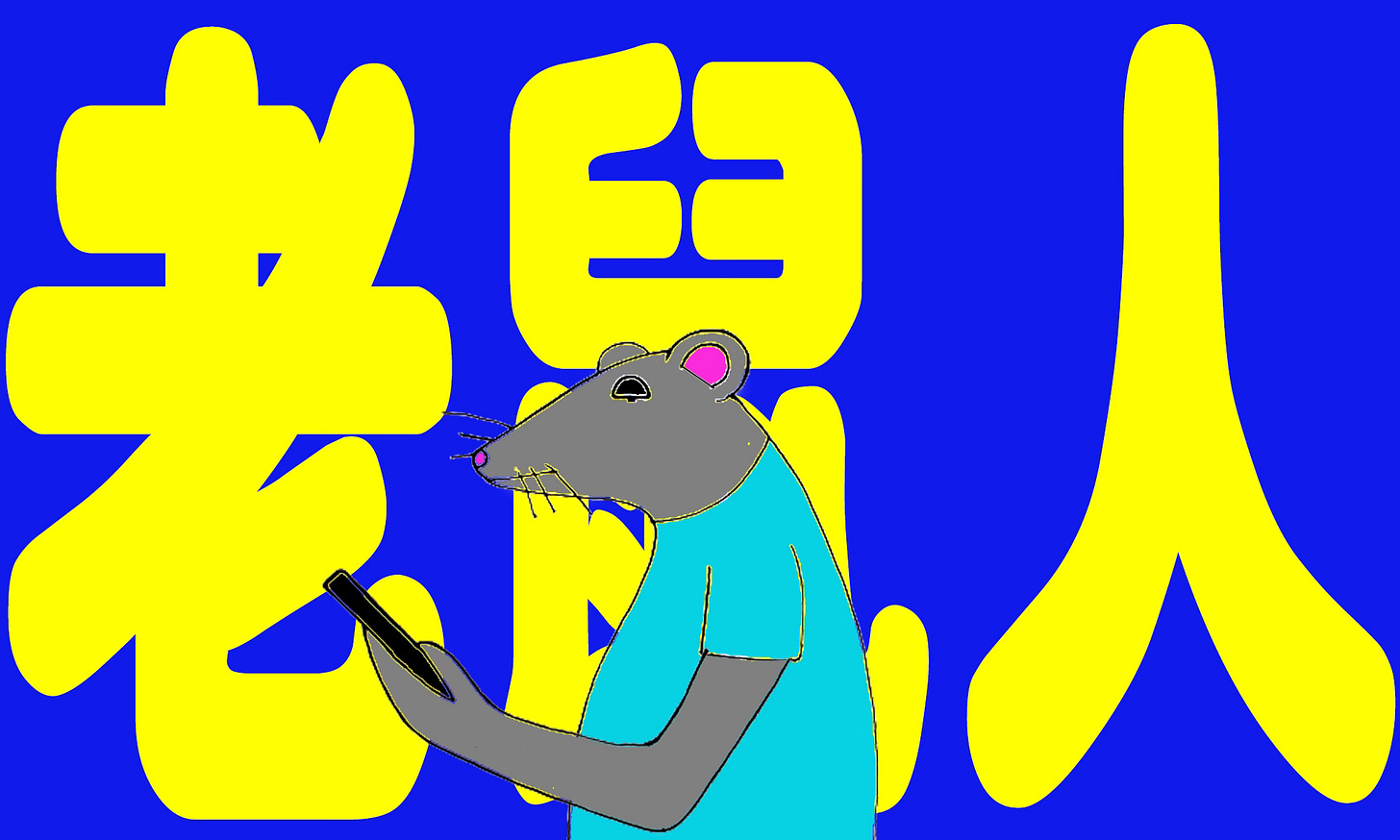
Our phrase of the week is: "rat people" (老鼠人 lǎo shǔ rén)
Context
Chinese Internet slang is a fast evolving language. New words and phrases are regularly created by internet users based on events and trends occurring in China.
Sometimes they become popular memes, and take on a life of their own, while other phrases appear fleetingly, and disappear just as quickly.
Some new phrases occasionally come to represent entire movements, or major social shifts, especially linked to youth culture in China, like the term "lie flat" (躺平).
As discussions around the challenges of some young people in China continues, a new phrase has appeared in recent months to add to the lie flat lexicon:
A new phenomenon has emerged online recently — “rat people.” So what does this term refer to? It describes a mental state with the following behavioral patterns: no motivation and low productivity; feeling tired during the day and staying up late at night; anxious about the future but not taking action; wanting to change, but just unable to move.
最近在网上,出现了一种新现象——老鼠人,什么是“老鼠人”?老鼠人是一种社会心理与行为状态:做事提不起劲,效率低下;白天昏沉,晚上熬夜;对未来焦虑,却缺乏行动;想改变,但就是动不了。
zuìjìn zài wǎngshàng, chūxiànle yì zhǒng xīn xiànxiàng — lǎoshǔ rén, shénme shì “lǎoshǔ rén”? Lǎoshǔ rén shì yì zhǒng shèhuì xīnlǐ yǔ xíngwéi zhuàngtài: zuòshì tí bù qǐ jìn, xiàolǜ dīxià; báitiān hūnchén, wǎnshàng áoyè; duì wèilái jiāolǜ, què quēfá xíngdòng; xiǎng gǎibiàn, dàn jiùshì dòng bù liǎo.
And with that, we have our Sinica Phrase of the Week.
What it means
The phrase “rat people” (老鼠人) began gaining traction in early 2025. It evolved from an earlier internet meme, “rat literature” (鼠鼠文学), a buzzword that first emerged in early 2023. In modern Chinese, the word “literature” is often used to mean “-ism.”
The “rat-ism” phrase started life in online communities in China. It plays on the phrase, “Uncle, I…” (叔叔我呀” shūshu wǒ ya) — a self-deprecating slang phrase mimicking the tone of a weary elder.
The character for “rat” (鼠鼠) replaces “uncle” (叔叔), which sounds similar, turning it into “Rat, I…” (鼠鼠我呀 shǔshǔ wǒ ya).
People used it to joke about their failings in life — low-paid jobs, no partner, no money. For example:
“I’m almost thirty, haven’t achieved a thing, got nothing I want, lived all these years for nothing.”
“鼠鼠我啊,快三十了,一事无成,要啥没啥,白活了”
shǔ shǔ wǒ a, kuài sānshí le, yí shì wú chéng, yào shá méi shá, bái huó le.
This “rat” persona became a metaphor for those struggling at the bottom of the social ladder. Many described themselves as “sewer dwellers,” capturing the pressure and disappointment young people feel in education, work, and family. The tone was bleak but playful.
By 2025, a related phrase emerged on social media: “low-energy rat people” (低能量老鼠人). It was first popularized by Chinese students in the UK, enduring long, dark winters in isolation. Hiding from the sun and avoiding contact, they began calling themselves “rat people.” Vlogs tagged "A day in the life of a low-energy rat person" (低能量老鼠人的一天) spread across Chinese platforms and soon caught on back home.
Today, the term describes a growing number of mostly young people caught in a cycle of low motivation, poor sleep, endless scrolling, and minimal social or physical activity. It captures a mood of burnout and quiet defiance — a spiritual cousin of the “lie flat” (躺平) movement, rejecting the constant pressure to strive and succeed.
What began as a self-mocking joke and coping mechanism has gone viral, racking up over two billion views on social media. It gives people a way to laugh at their shared challenges and find solidarity in it.
Could this become a larger movement?
There are early signs it could be: the Baidu page for “rat person” is no longer available, and at the time of writing, WeChat searches for the term seemed to be restricted — often a sign that something is resonating widely.
Andrew Methven is the author of RealTime Mandarin, a resource which helps you bridge the gap to real-world fluency in Mandarin, stay informed about China, and communicate with confidence—all through weekly immersion in real news. Subscribe for free here.
Want to learn more “must-know” on-trend phrases to discuss the lives of rat people?
Gnaw away on the delicious but disgusting feast served up in this week’s RealTime Mandarin!



